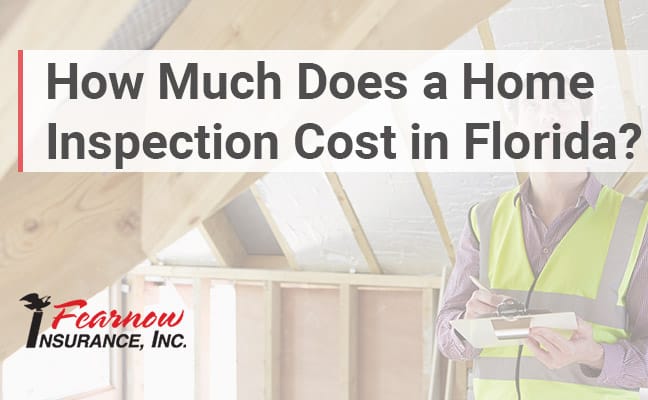How Much Does a Home Inspection Cost in Florida?
Are you considering buying a home in Florida? Buying a home in Florida can be an exciting opportunity to either move to the state or move to a neighborhood and home that better meets your family’s needs. However, before you finalize the deal, remember to get a home inspection. Home inspections check the property of the home and the house for issues that could cost you money in the short and long term. In this article, we’ll cover the average cost of a home inspection in Florida, what they entail and why you need one.
How Much Do Home Inspections Cost in Florida?
On average, you can expect to pay between $250 and $500 for a home inspection. It’s important to note that the size of the home and property plays a part in the cost of the inspection, meaning that an exceptionally small home may cost less than $250 and a very large home could cost $1,000 or more. However, the problems found during a home inspection could save you thousands by letting you know that the home’s problems may not be the right fit for you and your family, or by letting you renegotiate the home price based on the issues found during the home inspection.
What Does a Home Inspection Include?
A home inspection is typically non-destructive, meaning the home inspector doesn’t cut through drywall, flooring or ceiling tiles in order to see what’s hidden inside or behind walls. Instead, they inspect what is reasonably reachable and viewable.
The Exterior of the Home and the Property Surrounding It
The home inspector will walk around the exterior of the home, looking for problems with the ground. This could include improper storm drainage, which could be the result of bad grading of the soil, and odd puddles of water that could indicate problems with a septic tank or underground plumbing pipes. The home inspector will walk around the home, looking at the exterior cladding, whether that’s brick, stone or siding, looking for damage. He or she will examine the doors and windows for evidence of rot or decay.
The Interior of the Home
The home inspector will walk through the interior of the home, looking for issues with the framing or foundation, which could be indicated by cracks in the ceiling or walls. He or she will check the HVAC system and water heater for function and signs of disrepair, and the home inspector will check the electrical system, including the main electrical box for code violations. If the home has a basement or crawlspace, the inspector will walk through the basement and go under the house to look for additional issues.
The Kitchen and Bathrooms
The home inspector will walk through the kitchen and bathrooms, looking for soft spots in the floors or rot from water damage. He or she will check the electrical system for function and code problems, and the operation of the plumbing system will be checked.
The Roof
The home inspector will examine the roofing system, including the fascia and flashing for issues. If the home has an easily accessible attic, the home inspector will also enter the attic, looking for evidence of roofing leaks, like rusting nails and metal straps.
The Structure of the Home
The home inspector will pay special attention to the structure of the home. This includes the doors, windows and foundation. If the doors and windows don’t open easily or the frames aren’t square, this could indicate problems with the foundation.
How Do You Find a Home Inspector?
The best place to find a home inspector in Florida is on the International Association of Certified Home Inspectors (INTERNachi). The home inspectors listed in the INTERNachi database are licensed, trained, and certified.
Why Do You Need a Home Inspection?
The costs associated with buying a home and the desire to close the deal and move in as soon as possible may tempt you to skip the home inspection. However, you should always get a home inspection prior to purchasing a home, and your mortgage lender may require it. The good news is that you can make the sale contingent on the results of the home inspection, meaning that you’ll have seven days to back out of the agreement after the home inspection is complete. This is a good idea because the inspection may uncover harmful or even deadly issues with the house, like evidence of black mold, housing code violations and even severe electrical problems that could lead to a fire.
What Happens After the Home Inspection
Once the home inspection is complete, you will receive a home inspection report that lists all the problems with the home. For each issue, the home inspector should state whether it is a minor or major defect, a safety issue or a code violation. It will also tell you which items need to be repaired or replaced and which items need to be watched because they may need to be repaired or replaced at a future date.
Getting Home Insurance for Your New Home
If you do decide to purchase your new Florida home, don’t forget to get homeowners insurance. Homeowners insurance is designed to protect you against certain covered losses, like some types of weather damage, theft, vandalism and fire. Additionally, we can help you determine if your new home needs flood insurance and help you find the right policy for your needs.
To learn more about homeowners insurance, contact our agents at Fearnow in Florida today by dialing 813-689-8878.

